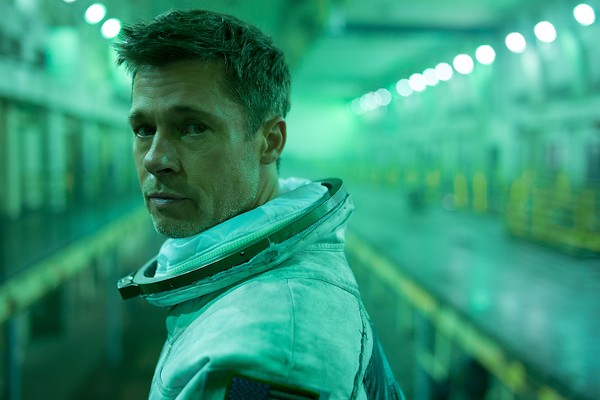Ad Astra
Ad Astra, 2019, 4 ½ stars
Star turn
Ad Astra is profound, hypnotic
From The Orlando Weekly, September 18, 2019
In Ad Astra, writer-director James Gray (The Lost City of Z) uses the largest canvas to paint the most intimate story. In doing so, he successfully interweaves a tale of space exploration with a much smaller and deeply introspective story of personal destiny and father-son relationships. The result is arguably the best film of 2019 so far.
This is a story set in the “near future: a time of both hope and conflict.” Brad Pitt plays Major Roy McBride, an astronaut and scientist working on the international space antenna. After a series of unexplained electrical surges nearly takes his life, top government officials confide in him that similar surges in the future may threaten all life on Earth.
The surges seem to be caused by an uncontrolled release of antimatter originating from the remains of a mission to Neptune. That expedition, which was tasked with searching for signs of intelligent life, was presumed lost more than a decade ago. And it was piloted by Roy’s father, Clifford.
Roy is told he’s the perfect candidate to help secure or destroy what’s left of the old spacecraft. That’s partly because he’s a true professional, a man whose heart rate during space exploration has never risen above 80 beats per minute. Indeed, his steadiness is so perfect that it worries him. “I should feel something,” he laments.
But he is chosen for another, obvious reason. As Clifford’s son, Roy is seemingly the best choice to contact the long-lost astronaut, if his father is actually still alive. Yet Roy hasn’t seen his dad since he was 16 years old. He’s both haunted by his presence, or lack thereof, and scared at the version of his father he might found out there at the edge of the solar system. Will it be a version of himself?
Existential themes are the stars of this film, but the actors are worthy of praise too. Pitt gives his best performance since The Curious Case of Benjamin Button 11 years ago, capturing – in both voiceover narration and live performance – a dramatic stillness that few actors achieve. He’s hypnotic, as is the entire production. Though his role is much smaller, the same can be said for Tommy Lee Jones, as the elder McBride. And Donald Sutherland and Ruth Negga, in intriguing supporting roles, add complexity, subtlety and gravitas.
The other co-star is Hoyte van Hoytema’s cinematography. The visual genius behind Christopher Nolan’s Dunkirk and Interstellar (which feels much like Ad Astra) is again at the top of his game, assisted admirably by Max Richter’s inspirational score, not to mention an impeccable sound design and impressive but never obtrusive special effects.
The film’s only drawback might be the vagueness of its science, as it never fully explains the details of, or personal motivations behind, the dangerous antimatter reaction. But Gray, who co-penned the script with television writer Ethan Gross, is not focused on answering every question. He prefers to ask them. Must the son suffer the sins of the father? And is our destiny genetic, or can we break free of a predetermined path to chart our own life course?
The movie also turns smart science fiction on its head in regard to the bigger questions, by wondering out loud whether we are alone in the vastness of space. Though it owes much to 2001: A Space Odyssey – and even contains a shocking homage to the “dawn of man” – Ad Astra asks us to contemplate a universe without the Monolith. What if “we’re all we’ve got”? Are we enough for ourselves?
When told that his dad might still be alive, Roy asks himself, “What did he find out there? Did it break him, or was he already broken?”
Gray withholds a tidy answer. Instead, he turns the question on his audience, challenging us to look not toward the stars for explanations – as the movie’s title implies – but inside ourselves.
© 2019 Orlando Weekly /MeierMovies, LLC
